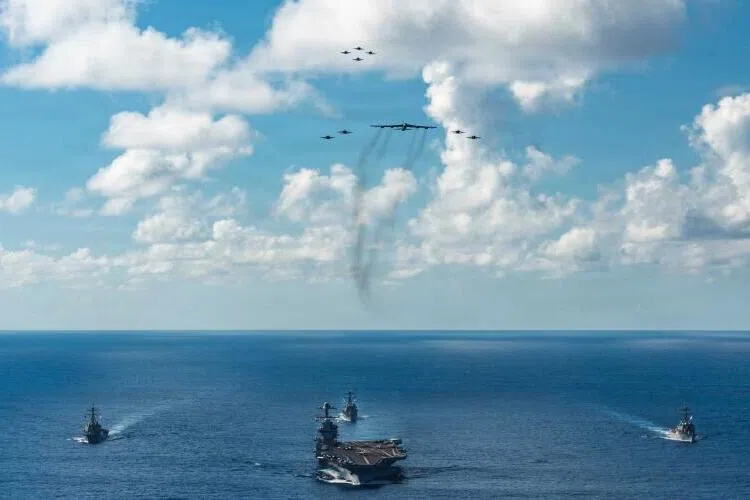US aircraft carrier arrives in the Caribbean amid military build-up near Venezuela
Sign up now: Get ST's newsletters delivered to your inbox

The US Navy’s Gerald R. Ford carrier strike group, including the flagship USS Gerald R. Ford (front) at an undisclosed location in the Atlantic Ocean on Nov 13.
PHOTO: AFP
WASHINGTON – A US aircraft carrier is now in the Caribbean Sea to bolster an anti-narcotics campaign, the military announced on Nov 16 – a move sure to anger Venezuela – as US forces struck another alleged drug boat in the eastern Pacific.
US President Donald Trump has ordered a troop build-up in the Caribbean as part of an anti-trafficking initiative, but speculation has abounded that Washington may be contemplating military intervention against Venezuelan strongman Nicolas Maduro.
The US Southern Command (SouthCom), which oversees American forces in Latin America and the Caribbean, had previously said that the USS Gerald R. Ford carrier strike group had entered its area of responsibility.
On Nov 16, it announced in a statement that the strike group had entered the Caribbean Sea, saying the move follows Mr Trump’s “directive to dismantle transnational criminal organisations and counter narco-terrorism in defence of the homeland”.
The strike group includes the most advanced US aircraft carrier, two guided-missile destroyers, and other support vessels and aircraft.
It joins several warships already in the Caribbean, with the deployment dubbed “Operation Southern Spear”.
As part of that operation, Southcom announced that a new strike took place on Nov 15 in the eastern Pacific, killing three suspects.
Since launching the anti-trafficking military campaign
The US has released no details to back up its claims that the people targeted – in both the Caribbean and eastern Pacific – in the more than 20 strikes were actually traffickers.
Experts say the deaths amount to extrajudicial killings even if they target known traffickers.
‘Irresponsible’
Caracas, meanwhile, views the military build-up as an explicit threat.
The US does not recognise Mr Maduro as Venezuela’s legitimate president and has issued a US$50 million (S$65 million) bounty for his capture to face charges of leading a drug cartel.
Amid reports that Mr Trump held meetings with military advisers on potential options for Venezuela, the US President on Nov 14 told reporters he had “sort of” made up his mind on the issue.
“I can’t tell you what it is, but we made a lot of progress with Venezuela in terms of stopping drugs from pouring in,” he said aboard Air Force One.
He had previously said in a CBS News interview that he doubted the US would go to war with Venezuela, but that he believed Mr Maduro’s days were numbered.
The US military has also been stepping up its presence in Trinidad and Tobago, an archipelago just off Venezuela’s coast.
US and Trinidadian forces were due on Nov 16 to begin joint training exercises for the second time in less than a month. On Nov 15, Mr Maduro blasted the drills as “irresponsible”.


